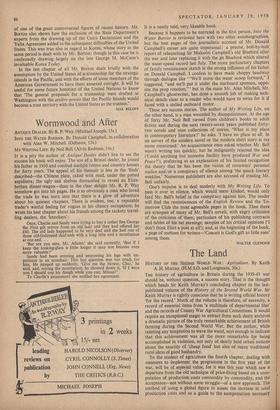Wormwood and After
INTO THE WATER BARRIER. By Donald Campbell, in collaboration with Alan W. Mitchell. (Odhams, 15s.) MY WRITING LIFE. By Neil Bell. (Alvin Redman, 16s.) IT is a pity the author of Antique Dealer didn't live to see the success his book will enjoy. The son of a Bristol dealer, he joined his father in 1910 and combed auction rooms and country houses . for forty years. The appeal of his memoir is less in the 'finds'. described—the Chinese plate, caked with mud, under the potted aspidistra; the ugly oak shelves dismantled to reveal an Eliza-
bethan dinner-wagon—than' in the clear delight Mr. R. P. Way somehow, got into his pages. He is so obviously a man who loved the trade he was born into that there is a glow of adventure
about his quietest chapters. There is evident, too, a reputable trader's wistful feeling for rogues in his chancy occupation; he wrote his best chapter about his friends among the rackety travel- ling dealers, the 'knockers' :
Once, Charlie and Sandy were trying to buy a rather fine George the First gilt mirror from an old lady and they had offered her t60. The old lady happened to be very deaf and she had one of those old-fashioned deaf-aids with a long tube and a mouthpiece at one end.. .
`But are you sure, Mr. Adams,' she said earnestly, 'that if I keep the looking-glass a little longer it may not become even more valuable?'
Sandy had been crossing and uncrossing his legs with im- patience in an armchair. This last question was too much for him. He jumped up suddenly, 'Give me the blower, Char,' he said, and, seizing the mouthpiece, he shouted down it, 'If I were you I should cop his dough while you can, Missus!'
To Charlie's amazement she nodded her agreement. It is a neatly told, very likeable book.
Because it happens to be narrated in the first person, Into the Water Barrier is reviewed here with two other autobiographies, but the best pages of this journalistic account of Mr. Donald Campbell's career are quite impersonal: a precise, bolt-by-bolt report of relaunching Sir Malcolm Campbell's old Bluebird after the war and later replacing it with the jet Bluebird which altered the water-speed record last July. The more perfunctory chapters of family reminiscence sketch in the strong influence of his father on Donald Campbell. I confess to have made choppy headway through dialogue like "We'll move the water scoop forward," I suggested, "and we'll put it under the starboard sponson, oppo- site the prop rotation,"' but in the main Mr. Alan Mitchell, Mr. Campbell's ghostwriter, has done a smooth job of making tech- nical details clear to a reader who would have to swim for it if faced with a stalled outboard motor.
These are success stories. The author of My Writing Life, on the other hand, is a man wounded by disappointment. At the age of forty Mr. Neil Bell turned from children's books to adult fiction and during the next twenty-seven years published forty- two novels and nine collections of stories. 'What is my place in contemporary literature?' he asks. 'I have no place at all. In no survey of the modern novel or the modern short story is my name mentioned.' An acquaintance once asked whether Mr. Bell wasn't writing too quickly, but he indignantly rejected the idea (`Could anything but immense facility have produced War and Peace?'), preferring as an explanation of his limited recognition the theory that he has been the victim of reviewers' personal malice and/or a conspiracy of silence among 'the quack literary weeklies.' Numerous publishers are also accused of treating Mr. Bell unfairly.
One's impulse is to deal tenderly with My Writing Life. To pass it over in silence, which would seem kindest, would only feed Mr. Bell's belief in the conspiracy against him. The reader will find the reminiscences of the English Review and the To- morrow Club the most agreeable pages in the book. Then there are synopses of many of Mr. Bell's novels, with angry criticisms of the criticisms of. them; particulars of his publishing contracts and tables of his net earnings; samples of his critical opinions CI don't think Eliot a poet at all'); and, at the beginning of the book, a page of mottoes for writers—`Conceit is God's gift to little men' among them.
WALTER CLEMONS


































 Previous page
Previous page